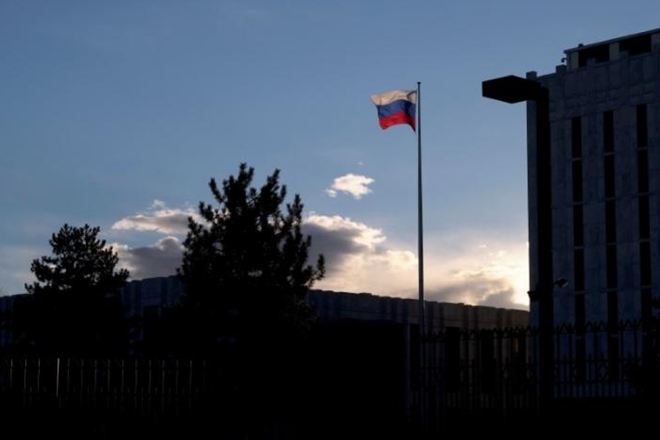Trump aide says U.S. sanctions on Russia may be disproportionate
- Trump tweets about nuclear weapons, raising questions and fears
- Trump after Berlin, Turkey attacks: 'I've been proven to be right'
- Trump wins U.S. Electoral College vote; a few electors break ranks
- Obama sanctions Russia for intervening in 2016 election
Incoming White House press secretary Sean Spicer said on ABC's "This Week" that Trump will be asking questions of U.S. intelligence agencies after President Barack Obama imposed sanctions last week on two Russian intelligence agencies over what he said was their involvement in hacking political groups in the 2016 U.S. presidential election. Obama also ordered Russia to vacate two U.S. facilities as part of the tough sanctions on Russia.
 |
| The Russian embassy on Wisconsin Avenue in Washington December 29, 2016. REUTERS/James Lawler Duggan |
"One of the questions that we have is why the magnitude of this? I mean you look at 35 people being expelled, two sites being closed down, the question is, is that response in proportion to the actions taken? Maybe it was; maybe it wasn't but you have to think about that," Spicer said.
Trump is to have briefings with intelligence agencies this week after he returns to New York on Sunday.
On Saturday, Trump expressed continued skepticism over whether Russia was responsible for computer hacks of Democratic Party officials.
"I think it's unfair if we don't know. It could be somebody else. I also know things that other people don't know so we cannot be sure," Trump said.
He said he would disclose some information on the issue on Tuesday or Wednesday, without elaborating. It is unclear if, upon taking office on Jan. 20, he would seek to roll back Obama's actions, which mark a post-Cold War low in U.S.-Russian ties.
Spicer said that after China in 2015 seized records of U.S. government employees "no action publicly was taken. Nothing, nothing was taken when millions of people had their private information, including information on security clearances that was shared. Not one thing happened."
"So there is a question about whether there's a political retribution here versus a diplomatic response," he added.

